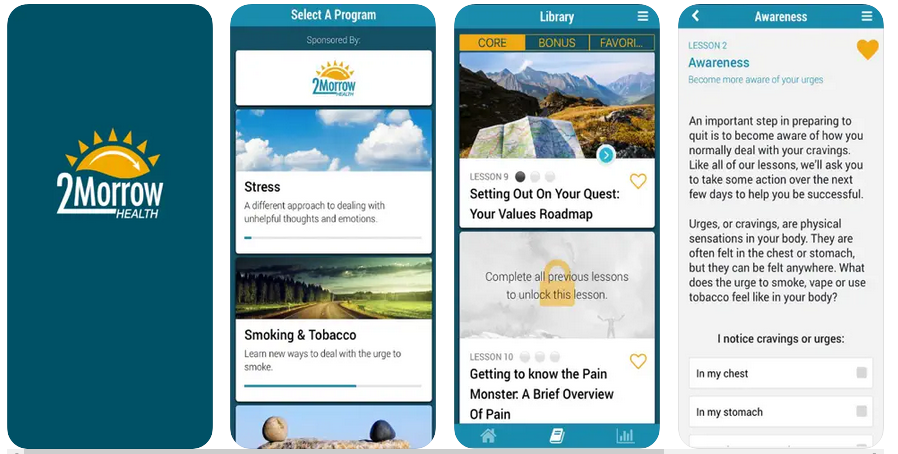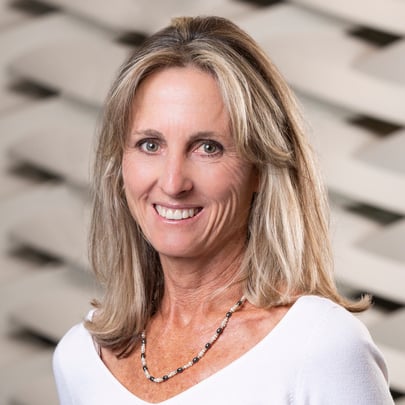Can your phone help you quit smoking? That's the goal of a project backed by the University of Colorado Cancer Center.
The CU Cancer Center and its partners are reaching out to people who smoke cigarettes and vape in Colorado to offer a smartphone app that a study has shown can help them quit.
Jan Lowery, PhD, MPH, assistant director for dissemination and implementation for the CU Cancer Center's Office of Community Outreach and Engagement, is heading up the project for the center.
Participants are given access to a smartphone app called 2Morrow Health, which uses a behavioral model called “acceptance and commitment therapy.” The CU Cancer Center has purchased a 12-month license allowing to offer the 2Morrow program for free, Lowery said.
Thoughts, feelings, and urges
As described by the app’s provider, the app helps “participants learn cutting-edge strategies that are effective when dealing with unhelpful thoughts, feelings, and urges that get in the way of long-term success (of stopping smoking). The personalized experience is private and non-judgmental with daily lessons, messaging, and customized tips. Participants can also message a live coach for extra support.”
“Instead of teaching avoidance of triggers” as a smoking-cessation strategy, Lowery said, the app “teaches people how to cope with those triggers as they come. For example, if they're sitting in a bar, and others are smoking, they can confront these triggers and learn how to cope with them.”
The project started over the summer in mountain counties and southeast Colorado, areas of the state with higher-than-average smoking rates, said Lowery, a cancer epidemiologist. She said that while Colorado’s smoking-prevalence rate of 12% is slightly lower than the national average of 14% as of 2020, in some areas of the state it’s as high as 25% among adults.
“There's great variability across our state, geographically,” she said. “But there’s also variability among racial and ethnic groups. Hispanic and Black populations have higher smoking prevalence compared to whites in Colorado. We also see higher prevalence among persons who are uninsured.”
The 2Morrow app offers three modules: One focused on adult smoking, another on pregnant women, and a third on vaping – the use of e-cigarettes, which is a particular concern when it comes to youths.
 A screenshot of the 2Morrow Health smartphone app. Photo: 2Morrow Inc.
A screenshot of the 2Morrow Health smartphone app. Photo: 2Morrow Inc.
Self-paced and private
Key partners in the outreach effort include Donna Starck, director of a nine-county Tobacco Control Program organized out of the Otero County Health Department, and Jamie Fanselow, a “regional health connector” for Clear Creek, Gilpin, and Park counties with the Front Range Area Health Education Center. The program is spreading the word by distributing flyers at community events with a QR code for the app, as well as via social media posts and through schools.
Lowery points out that the app is “self-paced, so participants can go through the program on their own timeline. And there’s privacy afforded by using a phone app. You don't have to talk to someone or go into a smoking cessation class. And people don’t have to travel to a class, which can be a barrier in rural areas, especially in wintertime. It is also offered in Spanish.”
Information on the program’s reach and impact, she said, is collected by the app as it’s being used, including data on whether users have attempted to quit smoking and for how long.
Lowery and her team hope to broaden the program across Colorado. “We intend to reach out to other public health departments and community partners to see if this is something they’d like to offer to their communities. The benefit for these communities is that it's free and it provides another option for persons who would like to quit.”
Appealing to values
The stakes for any smoking-cessation effort are high. Tobacco use is the leading preventable cause of cancer and cancer deaths. Cigarette smoking is the No. 1 risk factor for lung cancer, and is linked to about 80% to 90% of U.S. lung cancer deaths. Smoking is not only linked to lung cancer but also to cancers of the mouth and throat, voice box, stomach, esophagus, pancreas, kidney, liver, cervix, bladder, colon and rectum, and a type of leukemia.
And while the health impacts of vaping are less well documented, it’s known that the nicotine in e-cigarettes can harm adolescent brain development, and there’s evidence that young people who vape may be more likely to take up cigarette smoking.
The 2Morrow app was formerly branded as ICanQuit. A clinical trial by scientists at Seattle's Fred Hutchinson Cancer Research Center, published in 2020 in JAMA Internal Medicine, found that participants using the ICanQuit app, designed around acceptance and commitment therapy, were one and a half times more likely to quit smoking than those using a different app focused on teaching users to avoid smoking triggers.
“Acceptance and commitment therapy teaches skills for allowing urges to smoke to pass without smoking, which is conceptually distinct from ... approaches that teach avoidance of urges,” the 2020 study said. “Acceptance and commitment therapy motivates individuals who smoke to quit by appealing to their values, whereas (other) approaches motivate by using reason and logic.”
Lowery emphasized that the project “is not meant to compete with other effective smoking-cessation programs, like the QuitLine, which has been successful in Colorado for many years. The goal really is to provide an alternative to complement all the work that other programs have done in Colorado.”
Get the App
Here’s a link for Coloradans to sign up to use the 2Morrow Health app: 2morrowhealth.net/UCCC




.png)